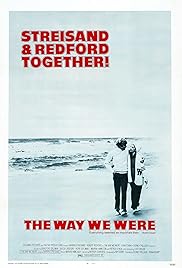WAY WE WERE, THE
(director: Sydney Pollack; screenwriter: Arthur Laurents/based on the novel by Arthur Laurents; cinematographer: Harry Stradling, Jr.; editor: John F. Burnett; music: Marvin Hamlisch; cast: Barbra Streisand (Katie Morosky), Robert Redford (Hubbell Gardner), Bradford Dillman (J.J.), Lois Chiles (Carol Ann), Patrick O’Neal (George Bissinger), Viveca Lindfors (Paula), Allyn Ann McLerie (Rhea Edwards), Herb Edelman (Bill Verso), Sally Kirkland (Pony Dunbar), James Woods (Frankie McVeigh); Runtime: 118; MPAA Rating: PG; producer: Ray Stark; Columbia Pictures; 1973)
“Old-fashioned sudser.”
Reviewed by Dennis Schwartz
A nostalgic love story based on the book by playwright Arthur Laurents (written after he wrote the screenplay as a favor to producer Ray Stark, but since his screenplay wasn’t acceptable to Redford, feeling his part was undeveloped, 11 other writers were called in to get it up to speed–they include Francis Ford Coppola and Dalton Trumbo–until Laurents was called back to complete it). Director Sydney Pollack (“The Scalphunters”/”Tootsie”/”Out Of Africa”) gives the old-fashioned sudser a few lively slick moments in its opposites attract romance story, but keeps it shallow and never has much to say that’s meaningful about communist radicalism from the 1930s and from the McCarthy witch-hunts of Hollywood.
During her Williams College days Katie Morosky (Barbra Streisand) is the butt of jokes on campus as the humorless political activist for the Young Communist League, advocating for Franco’s downfall in the Spanish civil war; while handsome jock Hubbell Gardner (Robert Redford) is an apolitical Big Man on Campus who attracts the firebrand even though he ignores her. Eight years later the two accidentally meet in a NYC nightclub. He’s a Naval officer and she’s working for the Office of War Information, for a radio station and several other jobs. They fall in love and marry, even though they have nothing in common: she’s working-class Jewish, a leftist and uncompromising in her political beliefs and he’s an upper-crust WASP, who doesn’t take politics seriously. The couple will soon head to Hollywood, where aspiring writer Hubbell is set to write a screenplay for producer pal J.J. (Bradford Dillman) based on his book.
The House Committee on Un-American Activities’ Communist witch hunt is responsible for exposing their differences as not something that could be worked out, as Katie risks her career to protest the jailing of the Hollywood Ten in the 1950s while Hubbell takes a powder to save his career. The result is a divorce.
The two meet again in the 1960s, and successful TV writer Hubbell and nuclear protestor Katie, now remarried and raising their daughter, feel that old attraction but realize they shouldn’t see each other anymore.
This was the popular film where Robert Redford established himself as a superstar. Marvin Hamlisch won an Oscar for his song (the lyrics by Alan and and Marilyn Bregman, the song was sung by Streisand). Streisand got nominated for Best Actress. The dialogue was weak, but the actors were well-suited for their parts and made the most of such sluggish material.

REVIEWED ON 1/26/2010 GRADE: B-